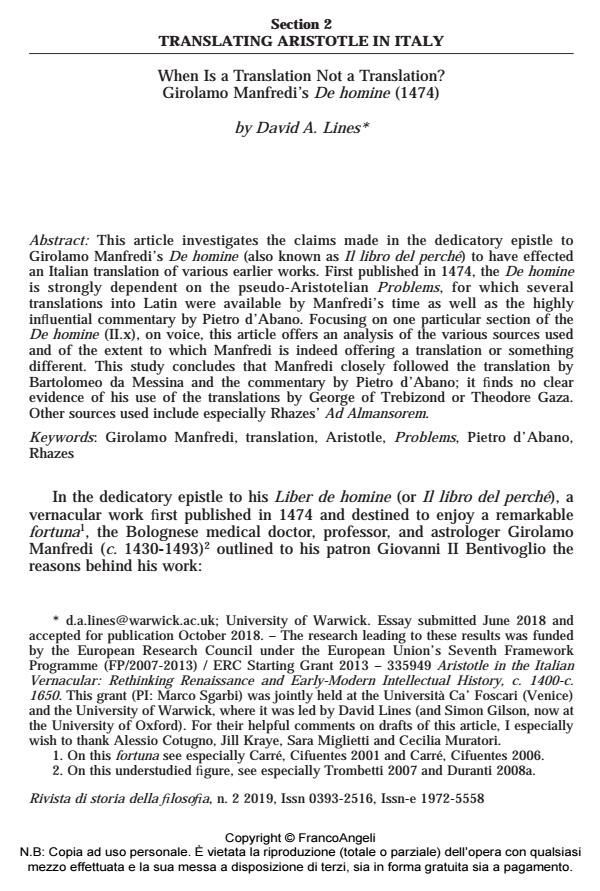When Is a Translation Not a Translation? Girolamo Manfredi’s De homine (1474)
Titolo Rivista RIVISTA DI STORIA DELLA FILOSOFIA
Autori/Curatori David A. Lines
Anno di pubblicazione 2019 Fascicolo 2019/2
Lingua Inglese Numero pagine 21 P. 287-307 Dimensione file 96 KB
DOI 10.3280/SF2019-002007
Il DOI è il codice a barre della proprietà intellettuale: per saperne di più
clicca qui
Qui sotto puoi vedere in anteprima la prima pagina di questo articolo.
Se questo articolo ti interessa, lo puoi acquistare (e scaricare in formato pdf) seguendo le facili indicazioni per acquistare il download credit. Acquista Download Credits per scaricare questo Articolo in formato PDF

FrancoAngeli è membro della Publishers International Linking Association, Inc (PILA), associazione indipendente e non profit per facilitare (attraverso i servizi tecnologici implementati da CrossRef.org) l’accesso degli studiosi ai contenuti digitali nelle pubblicazioni professionali e scientifiche.
This article investigates the claims made in the dedicatory epistle to Girolamo Manfredi’s De homine (also known as Il libro del perché) to have effected an Italian translation of various earlier works. First published in 1474, the De homine is strongly dependent on the pseudo-Aristotelian Problems, for which several translations into Latin were available by Manfredi’s time as well as the highly influential commentary by Pietro d’Abano. Focusing on one particular section of the De homine (II.x), on voice, this article offers an analysis of the various sources used and of the extent to which Manfredi is indeed offering a translation or something different. This study concludes that Manfredi closely followed the translation by Bartolomeo da Messina and the commentary by Pietro d’Abano; it finds no clear evidence of his use of the translations by George of Trebizond or Theodore Gaza. Other sources used include especially Rhazes’ Ad Almansorem.
Parole chiave:Girolamo Manfredi, translation, Aristotle, Problems, Pietro d’Abano, Rhazes
- The Vernacular Aristotle Eugenio Refini, (ISBN:9781108693684)
David A. Lines, When Is a Translation Not a Translation? Girolamo Manfredi’s De homine (1474) in "RIVISTA DI STORIA DELLA FILOSOFIA" 2/2019, pp 287-307, DOI: 10.3280/SF2019-002007